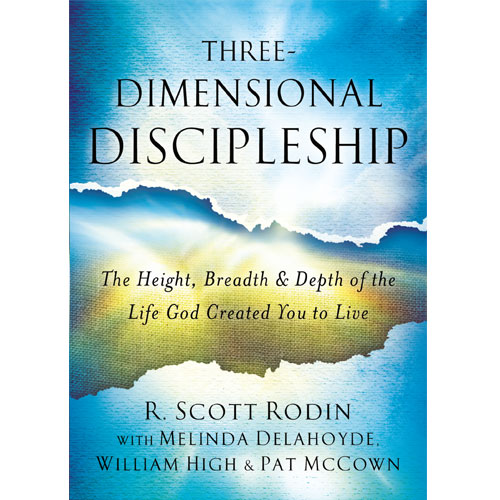Three Marks of an Abundant Leader
Learn How to Lead Abundantly with Time, People and Resources

“And my God will meet all your needs according to his glorious riches in Christ Jesus.” (Philippians 4:19)
“I never seem to have enough time in a day to do everything I need to get done in my ministry.”
“I just don’t have enough willing and skilled people to get the work done.”
“We are always short of funds to carry out our mission.”
Do any of these frustrations sound familiar to you? They are common challenges to leaders who are trying to do so much with seemingly so few resources. Time, people and money are the primary building blocks for any ministry, and when one, two or three are in short supply too often the leader is tempted, or forced, to step in and fill the gap. The problem in doing so is that it burns us out and never allows us to develop the resources needed for long-term success.
As leaders we have a choice. We can lead from a mindset of abundance or scarcity. We can see our resource glasses as half-empty or half-full. We can compete for limited resources of time, talent and treasure, or we can invest richly with what God provides, believing it is more than enough to accomplish what he calls us to do.
Abundance or scarcity? Enough or want? Competition or investment? The way we make these choices will mark our leadership, significantly impacting the people we lead and the organizations we serve.
Here are three marks of an abundant leader as we deal with time, people and resources.
1. Time
In the beginning, God created time.
“And there was morning and there was evening, the first day.” (Genesis 1:5)
God saw fit to create 24 hours in a day, and us with a need to sleep for eight of them. He calls us to set aside additional time for quiet, intimate engagement with Him. We also require the hours needed to attend to personal health and hygiene, relational and family priorities and general survival duties. The time remaining for our work is significantly limited by both the 24 hours of day and night, and the demands on our time that fall outside our work schedule.
This is how God created us, and he did so not expecting that the limited hours available for work would need to be filled with frantic, high stress activities because “there are just never enough hours in the day.” The truth is, there are enough hours in the day! That is exactly how God created the world, with enough of everything, including time to carry out the work to which he has appointed us.
What then is the problem? If it is not a shortage of time, perhaps it is our poor use of it, our inefficiencies and our waste. But honestly, I don’t think that is the greatest problem.
I believe our greatest weakness with regard to time is our pride! This is a hard statement, given the millions of deeply committed Christian leaders who are working incredibly hard to serve God faithfully. Yet I am convicted that we must raise it up and speak truth at this critical point in our work as leaders.
Ask yourself if a loving God would create a world where he supplied us with about eight hours in a day for work, only then to call us to a ministry where our success demanded that we spend twelve or fourteen or sixteen hours a day, plus weekends? That is a definition of a fiend, not a friend.
God did not create us for stress, burnout, and a generally frantic life. He promised us a life that was defined by abundance (John 10:10).
The problem often lies in our own drive to succeed, which results in us saying ‘yes’ to more and more, taking on additional work and expanding our ministry, always believing that if it is for the Lord’s work, it must be right. Well, it isn’t always right.
Too often it is our own pride that leads us to believe that either the work will not get done without us (and therefore, God needs us) or that it will not get done soon enough or well enough if we do not do it (and therefore, God really needs us). Both, of course, are absurd.
Can we believe that there are limits to the work God calls us to do? And when those limits are reached, that he has the capacity to bring in others to do the work or accomplish it in another way? If we cannot acknowledge this, we will be on a path to destruction, always agreeing to do more until we collapse. When this happens, it is not God who failed us, but our own pride that drove us to do more than God ever intended for us.
Most frightening, when we get out ahead of God, his hand of blessing is withdrawn from our work, for it then truly becomes our work. And no leader ever wants to be at that place!
Steward leaders develop work plans in a context of what is achievable given a God-pleasing use of time. They pray hard to keep any vestige of pride and ambition from the planning process. If there was ever a time for a leader to say the prayer, “It’s not mine. It’s yours,” it is during the planning process. Such a leader will always seek to set goals and take risks within a commitment to a God-pleasing use of time.
How do you steward the time of your organization, and do your expectations bear witness to a God-pleasing view of time? Replace pride with an openness for God to show you both the potential and the limits of your ministry, and work contently within each. After all, it is his ministry, not yours.
2. People
Ministry requires co-laborers; people who are called, gifted and empowered to serve alongside us in the work to which we have been called. Most ministry leaders would confess that they have empathized with the words of Jesus as he looked out at the wheat fields and lamented, “the harvest is plentiful but the workers are few.” (Luke 10:2)
The demands of our work often require us to recruit more and more people to fill key paid and volunteer positions. Unfortunately we often find too few people who are willing to make the commitment of time and talents that our vision requires.
When we are pressed for human resources we can, as leaders, fall into two traps that actually end up working against our passion to involve God’s people in God’s work. They are 1) the temptation to treat people as means and not ends, and 2) the desire to mold rather than unfold our people.
The first temptation is utilitarian; we need people to get a job done, so we approach people with the attitude of the ‘user’. We don’t do this consciously. We may believe that our ministry is to love and nurture and disciple our people. But when we are pressed, it is easy to see people as a means to an end, and when we do, we become users of people, not leaders.
We must be on guard for this temptation, for it will whither the soul of those with whom we work. Do you see your people as means to accomplish your work, or are your people your work?
The second temptation is to try to mold our people into the forms we need them to take in order to accomplish our goals. Again we may not do this consciously, but it is easy to become manipulative in the way we involve people in our ministry. The molding process seems like a faster and more efficient way to get things done, but it will steal the joy and passion of your people and assign them work that does not align with their giftedness.
The alternative process can be described as unfolding. We can help our people unfold the talents and character with which God has gifted them. Think of a flower in the spring or a piece of ornate origami. The more it is unfolded, the more beautiful it becomes. Every small movement unveils another hidden treasure. So it is with our people. As they are freed to see themselves as God sees them, they become more useful to the Master, and they respond with joyful obedience.
Are you trying to mold your people, or are you committed to seeing them unfold under the loving influence of the Holy Spirit?
There are enough people to serve our ministries, and they will willingly and joyfully follow the leader who loves them and helps them see in themselves the person God created them to be.
3. Resources
Ministry requires resources; the money, facilities and materials that are necessary to fund and support the work to which we have been called. Fundraising can seem like a relentless taskmaster, continually pushing us to find the money we need to pay salaries and meet operational expenses, and beyond that to expand into new areas and fund new programs.
Why is it so hard to fund God’s work? Let me offer three steps in raising resources in a God-pleasing and successful manner.
As leaders we carry the burden of finding more and more resources to finance our work. For most of us the work of raising money seems far removed from the work that we love and feel called to do. This feeling can lead to the temptation to separate our fundraising work from our ‘real ministry’.
We adopt the attitude that we will endure the hardship of fundraising if it will bring the money we need to ‘do’ our ministry. I would suggest this is an altogether wrong attitude.
Instead, we must understand that raising funds IS ministry. In fact, it may be one of the most transforming ministries we have! Remember Jesus’ words,
“for where your treasure is, there will your heart be also.” (Matthew 6:21)
We don’t raise money in order to do ministry, instead we do ministry in and through our work of raising money. Every person in our ministry needs to be equipped, guided and challenged to be a generous, faithful steward. They need to develop hearts that are rich toward God and experience for themselves the joy of selfless generosity. They need to give as a sign of their freedom from the greed and selfishness of our times. And they need to give that God may use them to build his kingdom.
For these reasons and more, our work of raising money is ministry. The first step in securing resources for your ministry is to own this statement and have it guide all you do.
The second step is honesty. We must be honest with our supporters as to our needs and the way their support will be used. If our supporters are more than checkbooks to us (and they must be!), they need to be well-informed of our challenges and opportunities as full partners in our work.
This is especially true in a time of financial shortfall. Rather than reducing communications, this is a time to share your needs with them openly and invite them to seek God in making a generous response. This requires time and presence. We must inform and involve our supporters in our work if we are to help them align their passions with our mission.
If we see fundraising as a part of our ministry (step #1), then we will make it a priority to invest the time to build open and honest relationships with our supporters. They in turn will respond with the generosity and support we need to carry out our work.
The third step is trust in God to bring the increase. If we truly believe that God’s people will support God’s work by listening and responding to the Holy Spirit, then we must trust that God will supply all of our needs. This is where Christian leaders must truly lead.
If we are always short of the money we think we need to fund our ministry, have we ever considered that God may be giving us all of what we need, asking simply that we be faithful in using it? If God is our supply, does it not make sense that what he is supplying may be sufficient, even if it seems like much less than what we want? Be faithful with what you have; be thankful for it and invest it wisely, and let God be your provider. If you do, it will always be ‘enough’ in kingdom terms.
I believe that following these three steps – seeing your fundraising work as ministry, being honest in communicating with your supporters, and trusting God to meet your needs – are the keys to raising resources as faithful steward leaders.
Remember, we worship a God of absolute abundance, and if we are faithful, he will indeed supply all of our needs, according to his great riches in Christ Jesus. May that be your legacy as you lead your ministry.





